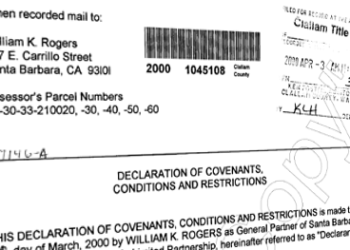Covenants or CC&Rs (Conditions, Covenants, and Restrictions) are restrictions on what you can do with your property. Of course, the idea of covenants on residential property is that they help maintain the residential character of the neighborhood. Typically that means restrictions on commercial activities (no raising livestock for commercial purposes, no retail businesses), restrictions on nuisances (no shooting of guns, no firecrackers), and restrictions that keep the area looking nice (no parking RVs on the subdivision roads, no garbage cans left on curbs, no visible TV antennas).
Covenants – Simple Restrictions
Some covenants are very simple with few restrictions, but there are many kinds of specific restrictions that can be found in covenants. I recently sold a beautiful water view lot to a couple from California. As part of my due diligence for my buyers, I obtained a copy of the covenants and reviewed them. There was one restriction that I knew would not work for my clients. No house could be built that would exceed a height of 20 feet. That’s a single story house. My clients want to build a two-story house to take advantage of the incredible water view, which includes the Strait of Juan de Fuca and the Dungeness Lighthouse.
Having been a real estate attorney for 20 years definitely helped me to know exactly how to address this issue to my client’s satisfaction. I went to the listing agent and ask him to have his seller see an attorney and have an amendment to the covenants drafted removing the single story restriction, and to have all the interested parties (the neighbors in that development) sign the amendment. Since all the neighbors had already built two-story homes, they had no objection to signing the amendment.
Isn’t it interesting that so many neighbors did not do their due diligence when they bought their land and built their homes? And I find it fascinating that their contractors who built their homes apparently did not due their due diligence to make sure they were not violating the covenants when they built the homes. A contractor could have been served with an injunction during construction, stopping everything, until a judge rendered a judgment on the enforceability of the covenants.
Covenants – Amendments
In this case, we have an amendment with signatures, but what do you do if one or more of the neighbors refuse to sign an amendment like this? There is another avenue in some cases. Here we had a blatant disregard for the building height restriction by nearly every property owner in the development. All the homes were two-story homes and there was only one other vacant lot not yet built on. The legal doctrine of waiver would apply here, meaning that if homeowners ignore and violate a restriction in the covenants for a sufficient period of time, that restriction become void and unenforceable. Anyone who did try to enforce the restriction would find out they spent a lot of money on an attorney for nothing, because they would lose. Not only that, covenants include a provision for reasonable attorney’s fees against the losing party.
Covenants – Lessons for Buyers
This story has two lessons for us. The first lesson is that you really need to do your due diligence when you are drafting an offer and while it is a pending offer. But the sub-lesson here is that very few Realtors and contractors know some of the traps for the unwary. You need a professional with the knowledge and experience to know what questions to ask and what stones to turn over. The second lesson I see in this story is that there are often answers to difficult issues that could otherwise destroy your retirement plans.
My father was a plumber who liked to tell this joke. A homeowner calls a plumber in an emergency. The plumber fixed the problem in just a few minutes, and the homeowners asks how much. When the plumber tells him $150, the homeowner says, “Wow, that’s more than I charge as a lawyer for 5 minutes.” The plumber responded, “Well, removing the blockage is only $10. Knowing where to look is $140.”
Understanding covenants are an important part of the due diligence I recommend my clients do before closing on a property.
Last Updated on November 22, 2011 by Chuck Marunde



































